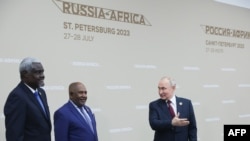Russian President Vladimir Putin opened the two-day summit Thursday hosting at least 17 African heads of state — fewer than the 43 African heads of state that attended the first meeting of its kind in Sochi in 2019.
At the beginning of the summit, Russia announced tens of thousands of tons of free grain to Burkina Faso, Zimbabwe, Mali, Somalia, Central African Republic and Eritrea — a promise made by Putin after Moscow pulled out of a crucial grain deal last week.
The Black Sea grain initiative had allowed the export of grain from Ukraine to countries in Africa and other parts of the world. Russia has blamed its withdrawal on Western sanctions, which it says hampers the country’s own exports of food and fertilizer.
Ukraine accounts for 10% of the world’s wheat market, 15% of the corn market and 13% of the barley market, according to the European Commission. Countries in Africa and the Middle East are among the top buyers of Ukrainian grain.
Vanda Felbab-Brown, a senior fellow at Washington-based think tank Brookings Institution, told VOA’s Straight Talk Africa that by withdrawing from the grain deal, Putin has pushed up inflation and global food prices and now risks alienating African countries.
"For over a decade, Russia has postured in Africa that it is an alternative to — even a replacement for — the United States," she said.
While maintaining "an explicitly anti-Western, anti-American foreign policy in Africa," she said, Russia has failed to deliver on its economic, technological and, increasingly, security promises.
A reliable trade and investment partner
Analysts say the two-day summit presents African leaders with the opportunity to gauge whether Russia can be a reliable trade and investment partner.
According to the Africa Center for Strategic Studies, Russia contributes less than 1% of the $83 billion in foreign direct investment going to the African continent.
Its economic engagement with Africa is primarily trade-based to the tune of an estimated $14 billion, compared to the value of African trade with the European Union's $295 billion, China's $254 billion, and the United States' $65 billion.
Over 70% of Russia’s trade with Africa is concentrated in only four countries: Egypt, Morocco, Algeria and South Africa.
"When it comes to weapons sales and the kinds of security activities it conducts on the continent through mercenaries like the Wagner group —as well as the sale of surveillance, military and police equipment — I think that’s really where the center of gravity is with regards to Russian engagement in Africa," Africa Center for Strategic Studies researcher Paul Nantulya told VOA.
"In terms of what African countries are going to take away from this summit, I think it’s probably going to be more on the security front," he added.
The stakes at the summit are high for several African countries but particularly for South Africa, which has come under fire and pressure from the U.S. for its perceived close ties with the Kremlin.
Pretoria announced last week Putin will not be in the southern African nation for the August BRICS summit after the International Criminal Court issued a warrant for his arrest.
Putin has visited sub-Saharan Africa only once in his more than two decades in power.
The Russian leader will likely use the Russia-Africa summit as an opportunity to court additional allies, Nantulya said, especially countries with relatively new administrations, including Kenya, Nigeria and Zambia, in an attempt to shore up as much support from the continent as possible.









Forum